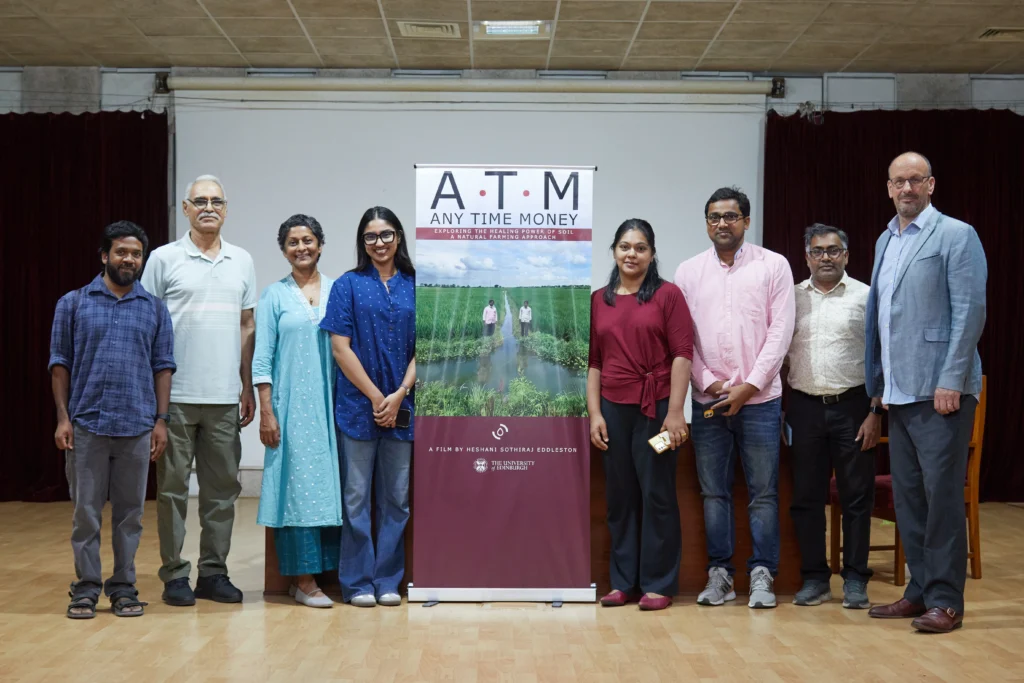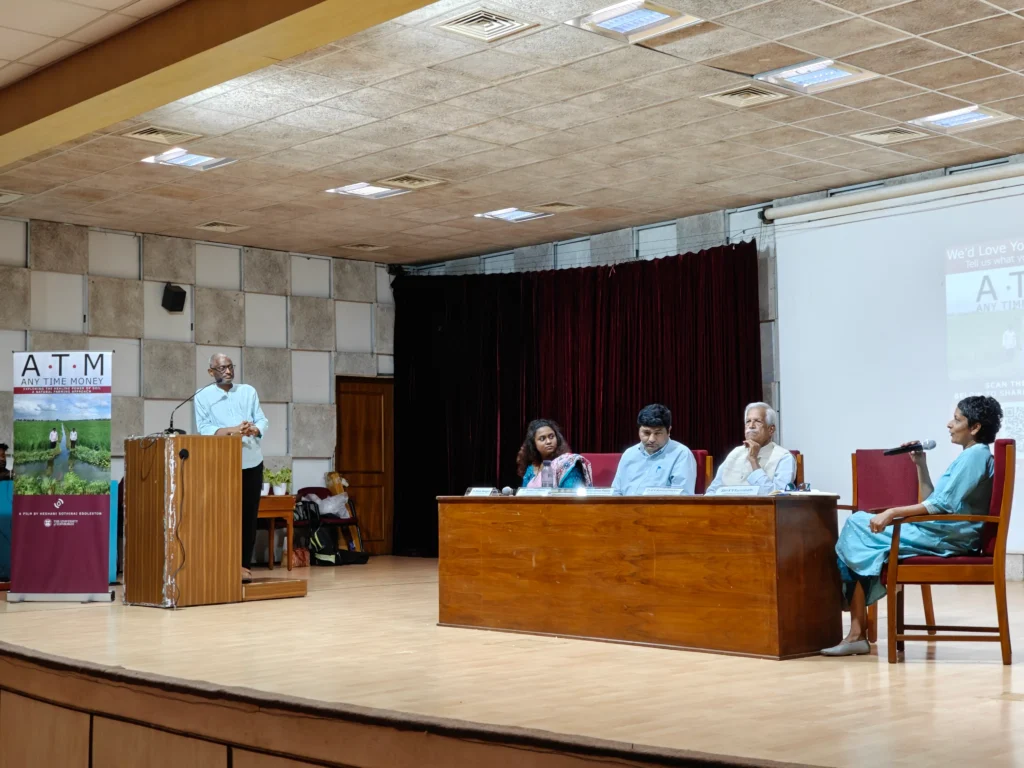A compelling new documentary exploring natural farming, soil health and the future of our food premiered on Monday 28th July at the Centre for Economic and Social Studies (CESS) in Hyderabad, India.
 The event, co-organised by the Centre for Sustainable Agriculture (CSA) and the Centre for Pesticide Suicide Prevention (CPSP), University of Edinburgh, was attended by government officials, agricultural experts, community leaders, farmers, and students.
The event, co-organised by the Centre for Sustainable Agriculture (CSA) and the Centre for Pesticide Suicide Prevention (CPSP), University of Edinburgh, was attended by government officials, agricultural experts, community leaders, farmers, and students.
The documentary highlights the transformative journey of farmers in Andhra Pradesh who are embracing natural farming to restore soil health and combat climate change.
Through powerful narratives from farmers, experts, and students, it showcases how this chemical-free, nature-aligned approach offers a sustainable solution for food security.
The film poses a critical question: Where will our food come from in 25 years?
It emphasises the vital role of soil, which stores approximately 2,500 billion tonnes of carbon – more than all the world’s forests combined.
By working in harmony with the land, these farmers are revitalizing ecosystems and championing a movement to safeguard the planet for future generations.
The screening was followed by an insightful panel discussion titled: Natural Farming: The Way Forward.
It addressed the urgent need for a transition in Indian agriculture.
Key challenges discussed included sustaining natural resources, adapting to climate change, ensuring farmer livelihoods and providing safe, healthy food for consumers.
The panel underscored that this transition requires collective action from farmers, consumers, and policymakers.
Key Insights from the Panel Discussion:

Sri Kodand Reddy, Chairperson, Telangana State Agriculture and Farmers Welfare Commission highlighted the adverse effects of high chemical use on farmers, farm workers and food safety.
He stressed that expecting farmers alone to bear the risks of transitioning to natural farming is insufficient.
Consumers must support fair pricing, and governments should provide subsidies and policies on par with conventional farming.
He also noted the influence of central policies, such as MSP procurement, fertiliser subsidies, and export-import decisions, on farmers’ choices.
Dr. Shaik N Meera, Director, ATARI, Hyderabad emphasised the growing acceptance of agroecological transitions within institutions like ICAR, though the pace of implementation varies.
He highlighted the importance of certification and branding to unlock better market opportunities and underscored Telangana’s potential to lead in fruit and vegetable production, particularly around Hyderabad.
Dr. Divya Veluguri, Program Director, Deccan Development Society shared insights from her research on natural farming in Andhra Pradesh.
She emphasised the critical role of resource augmentation and the need to support women farmers and labourers, who make significant contributions to the movement.
Dr. GV Ramanjaneyulu, Executive Director, Centre for Sustainable Agriculture discussed the interconnected economic and ecological crises in agriculture.
He stressed that meaningful change at the farmer level requires supportive markets and policies that align with sustainable practices.
Ms Heshani Sothiraj Eddleston, Producer and Director of the A.T.M documentary reflected on the motivations behind the film.
She shared that the documentary was conceived as a platform to highlight the transformative potential of natural farming practices across Andhra Pradesh.
The film was shaped to draw attention to the deep interconnections between soil health, ecological farming methods, and community resilience.
A strong emphasis was also placed on women’s empowerment, as the film foregrounds the vital yet often unacknowledged role women play in leading natural farming initiatives and rebuilding agrarian systems.
Through personal narratives, the restoration of degraded lands and the revival of traditional, sustainable agricultural practices were brought into focus.
She also highlighted that for natural farming and soil regeneration to be scalable, they must be supported through enabling policies, adequate resources, and a long-term vision.
Personal reflections on the screening
Dhannya V Sasi, Projectand Policy Officer at the Centre for Pesticide Suicide Prevention (CPSP), University of Edinburgh, said:
“The launch went well and it was heartening to see how deeply the film resonated with local communities and officials alike.
“Many said they felt seen, heard, and inspired, which made all the work behind the scenes feel truly worthwhile and reminded me why this story needs to be told.”
Dr Ramanjaneyulu GV, Executive Director, at the Centre for Sustainable Agriculture in Hyderabad, who took part in the film, said the event went well.
“Taking part in the ATM film was a huge honour for us and meaningful opportunity to amplify the voices of farmers who are proving that natural farming is not only viable but vital.
“Farming itself will never die because people will always need food. But it is the small farmers who are dying because they do not have the right support systems and are often pushed into using harmful chemicals.
“At CSA, we help farmers to make the transition to sustainable natural farming practices and this film shows what’s possible when they lead the way toward sustainability and self-reliance.”
Mounika Bhukya, Project and Policy Officer at the Centre for Pesticide Suicide Prevention (CPSP), University of Edinburgh, said:
“We’re so happy with how the film was received in Hyderabad.
“It opened up honest conversations about natural farming and gave space for farmers who practice natural farming to be recognised for leading the way in chemical-free farming practices.
“It was a privilege and honour for me to work alongside devoted farmers and communities on this film.”
Heshani Sothiraj Eddleston, who directed and produced the film for the Centre for Pesticide Suicide Prevention (CPSP) at the University of Edinburgh, said:
“The response to the A.T.M. film has been incredibly encouraging.
“It was moving to see so many people connect with the farmers’ stories and engage in meaningful conversations about sustainable agriculture.
“This was exactly what we hoped the film would achieve.
“Meeting the women and men practicing natural farming and witnessing their passion and care for the soil, their health, and their communities was an incredibly humbling experience for me.
“I made A.T.M. – Any Time Money to honor their hard work in nurturing the soil that produces healthier foods and provides them with a secure income.
“My goal was to create a film that not only documents this quiet revolution but also fosters conversations about how we can better support farmers and communities in making healthier and more sustainable choices.”
The event concluded with a resolution to organise a strategic planning meeting to advance natural farming in Telangana, involving key stakeholders.
The meeting was also attended by Dr. Michael Eddleston, Director of the Centre for Pesticide Suicide Prevention (CPSP), as well as Ms. Dhannya V Sasi, Mr. Bhawesh Jha, and Ms. Mounika Bhukya, representing the CPSP team.
Watch the official trailer: https://youtu.be/TJWSUgdxpH0
Key Facts
India has some of the highest rates of pesticide self-poisoning in the world.
The A.T.M. film shows how chemical-free farming is healing our soils, saving lives as well as helping reverse climate change.
An estimated 145 million cases of unintentional, acute pesticide poisoning are reported in India every year, leading to around 10,000 unintentional deaths.
However, intentional pesticide self-poisoning is also a significant concern, with 20% – 30% of all suicides in India thought to be from pesticide poisoning. While official reports estimate 25,000 deaths from pesticide self-poisoning each year, suicide is known to be significantly underreported.
A recent analysis of India’s suicide rate estimated that about 230,000 deaths occur annually. Given the extent of underreporting and the importance of pesticide suicides, the true number of deaths from pesticide self-poisoning may therefore be closer to 70,000 deaths each year.
Further information
The Centre for Pesticide Suicide Prevention has a team of Project & Policy Officers and consultants based in India. They work at both central and state level, building collaborations, supporting data collection, and engaging with policy makers. They also worked with local communities and helped produce the A.T.M. Film.
BLOGS:
- Pesticide Poisoning in India: Prevalence, Challenges and Opportunities.
- Inside Andhra Pradesh’s Natural Farming Movement.
- The Power of Storytelling: How documentaries inspire change.
NEWS:
COLLABORATOR:

